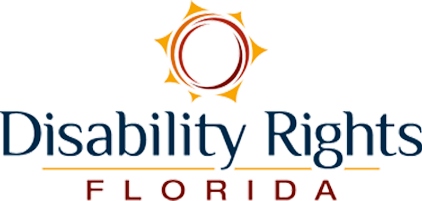Disability Rights Florida Blog
September is National Guide Dog Month, a time to recognize and appreciate the tireless efforts of service dogs. In this blog, we discuss the rights of owners of service dogs and their crucial role in assisting people with disabilities.
Your Rights
The Americans with Disabilities Act states that service animals must be permitted to accompany individuals with disabilities in all areas where members of the public are allowed to go. Service animals are defined as animals that are individually trained to do work or perform tasks for people with disabilities. An entity can ask whether an animal is a service animal because of a disability and about the tasks it is trained to perform. However, they cannot request documentation or ask about the person's disability.
Example Tasks
- Guiding people with visual impairments
- Alerting people who are deaf or hard of hearing
- Providing protection or rescue assistance
- Pulling wheelchairs
- Assisting during seizures
- Detecting allergens
- Retrieving items
- Providing physical support and balance
- Reminding individuals with mental illness to take prescribed medications
- Calming individuals during anxiety attacks
- and more
Housing Rights
Under the Fair Housing Act, it is illegal to discriminate against someone with a disability when renting or buying property. This means that even if a building has a policy against having pets, it is still a violation of rights to deny a blind applicant who requires a service animal to live in a rental unit.
Transportation Rights
Different regulations apply to service animals when traveling by plane, train, or automobile. Under the Air Carrier Access Act, only dogs that are individually trained to work or perform tasks for a qualified individual with a disability are recognized as service animals. The Air Carrier Access Act also has a variety of other requirements for service animals that are covered on their website. The Americans with Disabilities Act covers traveling with service dogs on railroads. Demand-response transportation services like Uber must provide access and services to individuals with service animals under the ADA.
Government Offices & Public Schools
Title II of the Americans with Disabilities Act (ADA) and the regulations implementing it require state and local government entities, including public schools, colleges, and universities, to make reasonable modifications to programs and services in order to allow access for individuals with disabilities. Service animals can be a reasonable modification or accommodation under Title II. The Individuals with Disabilities Education Act (IDEA) and Section 504 of the Rehabilitation Act provide additional legal standards.
Public Accommodations & Commercial Facilities
Title III of the Americans with Disabilities Act (ADA) and its regulations prohibit public accommodations from denying entry to service animals. Public accommodations refer to businesses that are open to the public, such as restaurants, theaters, hotels, grocery stores, hospitals, department stores, health clubs, parks, zoos, sporting facilities, and public transportation systems, including airlines, car rentals, trains and metro systems, buses and shuttles, and taxi services.
Owner's Responsibilities
Owners of service animals are responsible for ensuring that their animal is under their control while working. It is important that the animal does not pose a direct threat to the health or safety of others. Failure to control the animal or allowing it to pose a threat may result in the owner being asked to remove the animal from the premises. Additionally, owners are responsible for providing care and supervision for their service animals, including feeding, cleaning up after them, and identifying appropriate areas for animal use.
Safety Advice
Always remember to ask for permission before petting a service animal. These animals are specially trained to assist their owners with various tasks, and interrupting their work time with play time could be confusing to them and potentially dangerous for their owner. By respecting their space and not distracting them, you are helping to ensure that service animals can perform their important duties effectively.
Leave Us Your Comments
Please do not leave requests for assistance in the comments. Blog comments are not monitored by intake staff and your request may not be seen. Visit our Online Intake Page to request our services.
Commenting is not available in this channel entry.
Comments